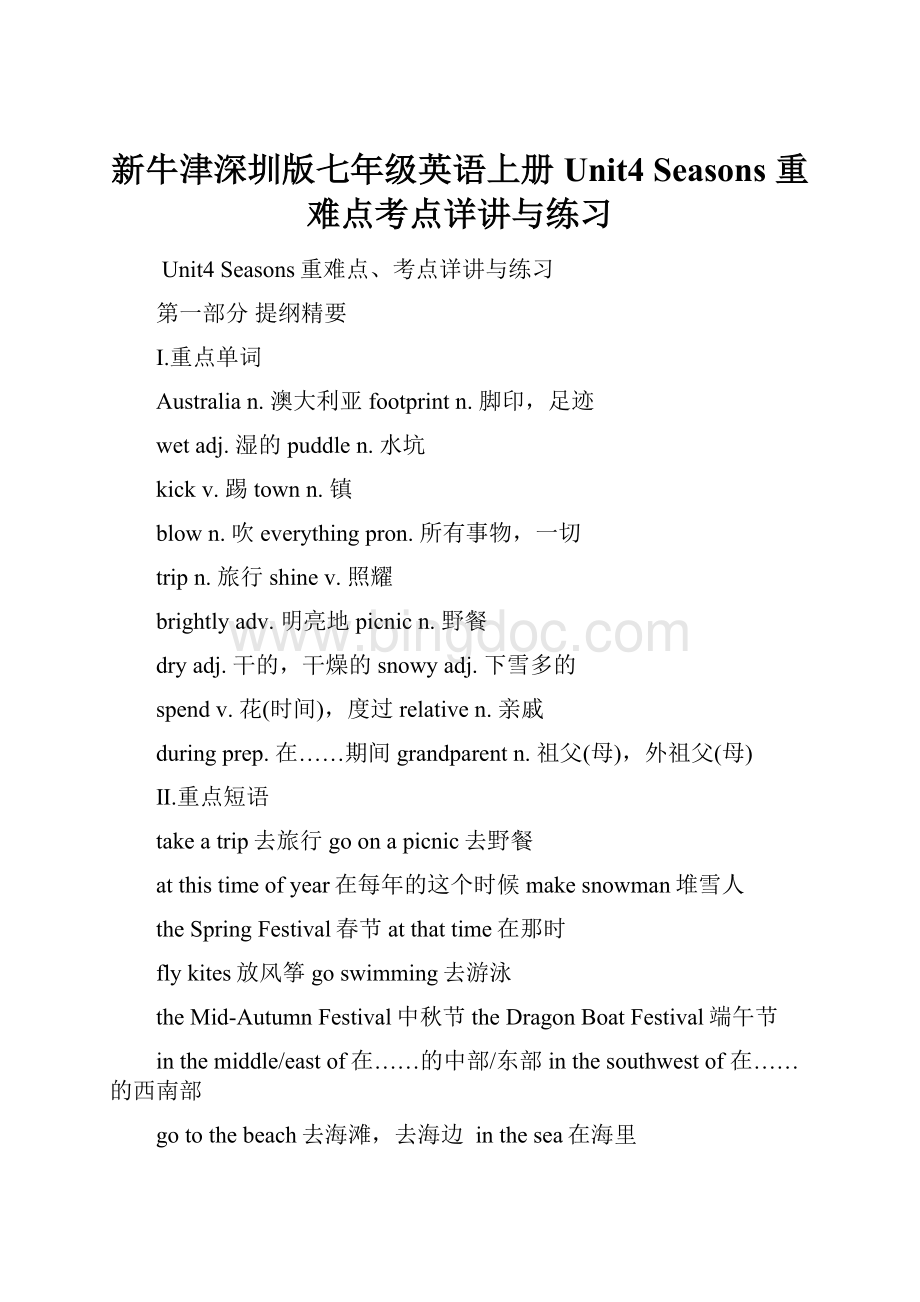新牛津深圳版七年级英语上册Unit4 Seasons 重难点考点详讲与练习.docx
《新牛津深圳版七年级英语上册Unit4 Seasons 重难点考点详讲与练习.docx》由会员分享,可在线阅读,更多相关《新牛津深圳版七年级英语上册Unit4 Seasons 重难点考点详讲与练习.docx(21页珍藏版)》请在冰点文库上搜索。

新牛津深圳版七年级英语上册Unit4Seasons重难点考点详讲与练习
Unit4Seasons重难点、考点详讲与练习
第一部分提纲精要
Ⅰ.重点单词
Australian.澳大利亚footprintn.脚印,足迹
wetadj.湿的puddlen.水坑
kickv.踢townn.镇
blown.吹everythingpron.所有事物,一切
tripn.旅行shinev.照耀
brightlyadv.明亮地picnicn.野餐
dryadj.干的,干燥的snowyadj.下雪多的
spendv.花(时间),度过relativen.亲戚
duringprep.在……期间grandparentn.祖父(母),外祖父(母)
Ⅱ.重点短语
takeatrip去旅行goonapicnic去野餐
atthistimeofyear在每年的这个时候makesnowman堆雪人
theSpringFestival春节atthattime在那时
flykites放风筝goswimming去游泳
theMid-AutumnFestival中秋节theDragonBoatFestival端午节
inthemiddle/eastof在……的中部/东部inthesouthwestof在……的西南部
gotothebeach去海滩,去海边inthesea在海里
getwet淋湿inthesnow在雪地里
Whatabout…?
……怎么样?
putforward把…向前拨,将…提前,提出
Ⅲ.重点句型
1.Watchusgo…看着我们离去
watchsb.dosth.看见某人做某事(强调动作的全过程)
watchsb.doingsth.看见某人正在做某事(强调动作正在进行)
类似用法的词还有:
see,hear,notice等
我看见他上了公交车。
____________________________________________________
2.Seehowdeepthepuddlesget.看水坑变得多深。
这是一个含有宾语从句的复合句,从句由疑问副词how引导,从句的语序是陈述语序。
我想知道他怎样去上学。
____________________________________________________________
请告诉我从你家到学样有多远。
______________________________________________________
3.Whatistheweatherlikeinspring?
春天天气怎么样?
=Howistheweatherinspring?
Whatissb./sth.like?
=Howissb./sth.?
询问“某人或某事怎样”的常用句型。
后面可接时间或地点的介词短语。
-What’stheweatherlikeinBeijing?
-It’scloudy.
-Howistheweatherinsummer?
-It’shot.
4.Inspring,theweatherstartstogetwarm.在春天,天气开始变暖。
(1)start意为“开始”,同义词为begin。
start与begin均可接todosth.或doingsth.,表示“开始做某事”,一般可互换。
但下列情形中,要注意其区别:
当谈论一项长期的习惯性的活动时,用动名词.如:
IstartlearningEnglish.我开始学习英语。
主语是物不是人时,用不定式。
如:
Theicebegan/startedtomet.Itstarttosnow.
start/begin本身是ing形式时,后面接不定式。
如:
I’mstarting/beginningtowritetheletter.
我正开始做晚餐了。
___________________________________
其后的动词与想法,感情有关时,多用不定式。
如:
Shebegan/startedtounderstandit.
此外,start还有(机器)发动,创办,动身出发等含义。
(2)get作连系动词,意为“变得”,后常接形容词作表语。
如:
Theweatherstartstogetcool.
作实义动词,意为“得到,收到”getaletterfromsb.=hearfromsb.收到某人来信
get
表示进入或变为某种状态
常接形容词
become
多用于书面语中,强调的是由一种状态变为另一种
可接形容词和名词
turn
强调的是变得和以前完全不一样
多接形容词,接名词时零冠词
grow
指的是渐渐地变成,强调变化的过程
多接形容词,也能接过去分词
go
多用来表示进入某种状态,多接令人不悦的形容词
bad,mad,hungry,wrong
例:
Thewindisgettingstrongerandstronger.
Iwanttobecomeateacher.
Whenshesawme,herfaceturnedred.
Theboyisgrowingthinner.
Eggssoongobadinhotweather.
5.Inautumn,everythingchanges.Leavesturnbrown,redoryellowandstartfallingfromthetrees.在秋天,一切都会变化。
树叶变成棕色,红色或黄色并开始从树上飘落。
(1)everything不定代词,意为“所有事物,一切”,在句中可作主语、宾语或表语。
everything作主语时,谓语动词用单数形式。
如:
Everythingbeginstogrowinspring.春天万物开始生长。
金钱不是一切。
____________________________________________
(2)turn+颜色,此处turn为系动词,后面接形容词。
(3)leaves是leaf“树叶”的复数形式。
leave做动词,是“离开,出发”的意思。
leavefor前往leaveAforB离开A地前往B地
6.Winterisoftencoldandsnowy.冬天经常寒冷多雪。
Snowy形容词
n.→snow,snow不可数名词“雪”;作可数名词时意为:
“一场雪”。
snow可作动词,意为“下雪”。
Itissnowingheavily.雪正下得很大。
Itisaheavysnow.这是一场大雪。
孩子们喜欢玩雪。
_____________________________________
7.PeopleusuallyspendtimewiththeirrelativesduringtheSpringFestival.在春节期间,人们通常都是和亲戚一起度过。
(1)spend动词“度过”,spendtimewithsb.意为“与某人一起度过时光”
Iusuallyspendmyfreetimewithmybestfriend,Tom.
此外,spend还有“花费,用(时间/金钱)”,常与介词in/on连用,主要用于以下句式:
人+spend+时间/金钱+onsth.“某人花费多少时间/金钱在某事上”
人+spend+时间/金钱+(in)doingsth.表示“花费多少时间/金钱做某事”
spendalldaywriting一整天都在写作
spendmoneyonbooks花钱买书
Shespendsallday(in)learningEnglish.
(2)during介词,“在……期间”theSpringFestival=theChineseNewYear
Don’tspeakduringthemeal.吃饭时别说话。
during与in
1.强调动作或状态的持续性时用during,某一动作发生在某一时间段中的某一时间点用in.
Duringthethreemonthshealwaysasksalotofquestions.
WeusuallyspendaholidayinJuly.
2.在季节名词前,用in是泛指,不用冠词;但是用during是特指,要用定冠词 the
Childrenenjoyflyingkitesinspring.
Weoftengoskatingduringthewinter.
3.在表示一段时间的名词(如holiday,stay,visit,lesson,meal等)前,一般要用during
IwenttoseemyuncleduringmystayinBeijing.
暑假我会去看望我的爷爷奶奶。
____________________________________________
8.Iloveallfourseasons.四个季节我都喜欢。
此处all为形容词,意为“所有的,全部的”,修饰可数名词的复数形式或不可数名词。
如:
Hespentallhismoney.
all的其它用法:
(1)all可与of连用,再接名词或代词。
接名词时,of可省略;接代词时,of不能省略。
All(of)theboysinourclassareverytall.
我们所有人都想去参观长城。
___________________________________________
(2)all作主语的同位语时,放在be动词之后,行为动词之前。
Weallgotoschooleveryday.
(3)作人称代词的同位语时,all可直接放在这些人称代词的后面。
Ourteacherlovesusall.
(4)all作副词,意为“都,全部,完全地”,主要修饰形容词、副词或介词短语。
Weareallwrong.
9.lovelychildren可爱的孩子们lovely形容词“可爱的,美好的,令人愉快的”
Heisalovelychild.
Wehavealovelyholiday.
大部分以ly结尾的词为副词,但是lovely,friendly,lively,lonely,silly,ugly,likely等为形容词。
10.MarrywillgetmaryiedonMondaymorning.玛丽将在星期一上午结婚。
getmarried意为“结婚”
marry用法小结:
(1)marrysb表示嫁给某人;与......结婚。
如:
JohnmarriedMarylastweek.上周约翰和玛丽结婚了。
(2)be/getmarriedtosb表示与某人结婚。
如:
Janewasmarriedtoadoctorlastmonth.上个月简和一位医生结婚了。
罗斯和一位教师结婚了。
_____________________________________
(3)marrysbtosb.“父母把女儿嫁给某人或为儿子娶媳妇。
”
如:
Shemarriedherdaughtertoabusinessman.她把女儿嫁给了一位商人。
(4)marry作不及物动词时,往往用副词或介词短语来修饰。
如:
Shemarriedveryearly.她很早就结婚了。
(5)marry一般不与介词with连用。
如:
她和一位英国人结了婚。
ShemarriedwithanEnglishman.【误】
【正】:
ShemarriedanEnglishman./Shewas/gotmarriedtoanEnglishman.
(6)若问某某是否结婚,而不涉及结婚的对象,可用be/getmarried的形式,相当于系表结构。
如:
你结婚了吗?
Doyoumarry?
/Haveyoumarried?
【误】
【正】:
Areyoumarried?
/Haveyougotmarried?
11.goswimming去游泳go+动词-ing
MyelderbrotheroftengoesswimmingonSundays.
常见搭配:
gofishing,goshopping,goboating,godancing,goskating,goclimbing
12.TheclocksinallpublicplacesintheUKareputforwardanhour,from1a.m.to2a.m.英国所有公共场所的钟表被向前拨了一个小时,从一点到两点。
本句含有被动语态,即主语是谓语动词所表示的动作的承受者。
结构:
be+动词过去分词
putforward“把……向前拨” Youcanputyourwatchforwardtenminutes.
此外,还可表示:
(1)向前移:
Whydon’tyouputyourchairforward?
你为什么不把椅子往前挪一点?
(2)将……提前:
我们不得不把会议提前。
___________________________________________
(3)
提出:
Pleaseputforwardanewplan.请提出一新的计划。
词汇练习
一、英汉互译
1.goswimming__________2.flykites__________
3.takeatrip__________4.haveapicnic___________
5.makesnowmen__________6.startdoingsth__________
7.duringtheday__________8.havealotoffun__________
9.去海边__________10.去野餐__________
11.结婚__________12.和某人一起渡过__________
13.在寒假期间___________14.变暖__________
15.在春天_________16.在一年的这个时候__________
二、根据下列句子的首字母提示,完成句子
1.Itsnowedyesterday,e_________iscoveredwiththewhitesnowoutsidenow.
2.Wewilltakeat__________toAmericathissummer.
3.Aftertherain,thesuncomesoutandshinesb__________
4.Didhe_________thewholedaydoinghomeworkwithhismother?
5.Winterisoftencoldands_________,butIlikeitmost.
6.Whichs_________doyoulikebest,spring,summer,autumn,orwinter?
7.Manypeopleliketogototheb________andswiminthesea.
8.Myhomeishalfak_________awayfromhere.
9.Leavest__________yellowinautumn.
10.Thew_________ishotinsummer.
三、根据句意及汉语提示写单词,补全句子。
1.Itisvery______________(湿润的)ontheground.Peopleareeasytofallover.
2.Helivesinasmall____________(镇)andheisverypoor.
3.Itisverycold.Andthewind_______________(吹)strongly.
4.Itisalways__________(干燥的)inthenorth-westofChina.
5.__________________(在...期间)thisholiday.Ivisitedtwoforeigncountries.
四、根据汉语提示,补全句子。
1.我希望我们寒假能一起去旅行。
Ihopewecan_____________________________________togetherinthewinterholiday.
2.冬天,孩子们经常一起在地上堆雪人。
Childrenoften_________________togetheronthegroundinwinter.
3.冬天去哈尔滨旅游是一件令人兴奋的事。
___________________________________________traveltoHarbininwinter.
4.有空的时候汤姆总喜欢跟亲戚待在一起聊聊天。
Tomusually_____________time_____________his___________andtalkswiththemWhenhe’sfree.
5.在春天,一切事物都变绿了。
__________________greeninSpring.
6.每年的这个时候天气总是很冷。
It’salwayscold___________________________________________________.
Ⅳ.重点语法
形容词
形容词在句中主要作定语,表语,宾语补足语。
(一)作定语:
修饰或限制名词或不定代词或疑问代词,或疑问副词。
1.前置定语:
形容词修饰或限制名词,一般放在它所修饰或限制的名词之前。
(1)OneNewYear’sDay,weputonournew clothes.
(2)IwanttomakesomeAmericanfriends.
(3)LiuSanziisaneight-year-oldboy.
(其中eight-year-old叫复合形容词,其构成形式是:
“数词+名词+形容词”,中间加连字符)
▲提示:
有的形容词只能作定语(不能作表语),如:
little(小的),only(唯一的),wooden(木质的),,woolen(羊毛质的),elder(年长的)。
如:
(4).MyelderbrotherisinBeijing.(正)Mybrotheriselder.(误)
2.后置定语
(1)形容词修饰或限制不定代词(something,anything,nothing,everything),常放在不定代词之后。
Ihavesomethingimportanttotellyou.Idon’twantanythingelse.
(2)else修饰或限制疑问代词(who,whom,what等)或疑问副词时,通常放在疑问代词或疑问副词之后。
Whatelsedoyouwant?
Whereelseareyougoingtovisit?
(3)enough作定语修饰或限制名词时,放名词之前;修饰形容词时,放形容词之后。
Pandaswillhaveenoughfoodtoeat.
YourEnglishiswonderfulenough.
(二)作表语:
放在连系动词之后,常见的连系动词有四种:
1.be动词
Planeswillbeverylarge.Runningistiring.
2.感官连系动词
feel(摸起来),look/seem(看起来),smell(闻起来),sound(听起来),taste(尝起来).
Cottonfeelssoft.
3.“变化”连系动词:
become,get,grow,turn,come,go.
Thefishwentbad. Treesturngreenwhenspringcomes.
4.“持续、保持”连系动词:
keep,stay
Pleasekeepsilent.MrJacksonstayedcool.
▲提示:
有的形容词只能作表语(不能作定语),特别是以a-开头的形容词,如:
afraid害怕,alone独自的,asleep睡着的,awake醒着的,alive活着的(有时可作后置定语),well健康的,ill病的,frightened害怕的
如:
Themanisill.(正)Theillmanismyuncle.(误)
(三)作宾语补足语:
常放在宾语的后面,用来补充说明宾语的性质,特征或状态。
Wepaintdoorsandwindowsred.
HisvoicemadehimfamousalloverEurope.
Whatmadeyousointerestedinmusic?
(四)作主语或宾语
1.形容词前加定冠词the,表示某一类人或物。
在句中作主语或宾语,作主语时,谓语动词要用复数。
如:
theold,theyoung,therich,thepoor,theblind等。
Therichshouldhelpthepoor.
2.表示国家和民族的形容词前加上定冠词the,表示这个民族的整体。
在句中作主语或宾,作主语时,谓语动词要用复数,如:
theBritish,theEnglish,theFrench,theChinese等。
TheEnglishhavethesenseofhumor.
(五)使用形容词的几个常用句型
1.Itis+adj.(forsb.)+todosth.“对某人来说做某事是怎样的。
”
常用形容词:
dangerous(危险的),difficult(